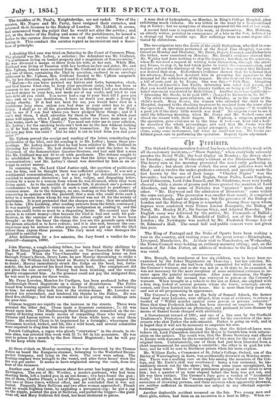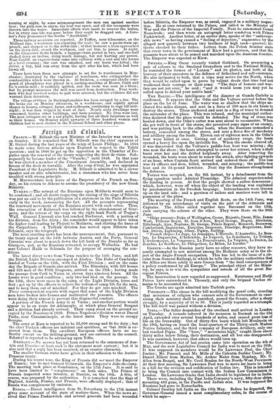'At lirraiturtg.
The Oxford Commemoration festival has been celebrated this week with all its customary incidents,—" Show Sunday," when everybody solemnly parades the Broad Walk ; the boat display on Monday ; the flower show on Tuesday; ending in Wednesday's climax at the Sheldonian Theatre. The heavy rain in the morning prevented the usual early gathering in the theatre ; but about eleven o'clock the area and galleries were well filled ; and at twelve the under-graduates entered, and speedily made the fact known by the use of their lungs. "Charley Napier" was the favourite ; but the names of Lord Raglan, Omar Pasha, Louis Napoleon, Lord Palmerston, Lord John Russell, and Mr. Gladstone, were very loudly cheered ; while a storm of groans and hisses greeted the mention of Lord Aberdeen, and the name of Nicholas was "groaned" more than any other. "Mr. Heywood and the admission of Dissenters" came within the same category. The procession was smaller than usual ; it comprised only eleven Heads, and no noblemen; but the presence of the Bishop of London and the Bishop of Ripon is remarked. Among those upon whom degrees were conferred were Prince Lucien Bonaparte, the Bishop of Natal, Mr. Henley M.P., Sir George Grey, and Admiral Moresby. The English essay was delivered by the author, Mr. Fremantle of Balliol ; the Latin poem by Mr. A. Blomfield of Bailie], son of the Bishop of London ; the Newdegate was recited by Mr. Frederick George Lee of St. Edmund's Hall. The usual ball and public concert were not given this year.
The King of Portugal and the Duke of Oporto have been making a tour in the country, and visiting some of the great towns—Birmingham, Liverpool, Manchester, tee. At their visit to Manchester, on Wednesday, the Town-Council were holding an ordinary morning sitting ; and, on the motion of Sir John Potter, an address of welcome to the Royal visitors was voted.
Mrs. Brough, the murderess of her six children, was to have been re- examined by the Esher Magistrates on Thursday ; but her solicitor, Mr. Everest, stated that as she had been fully committed for wilful murder on the Coroner's warrant, and as she was not in a fit state to be examined, it was not necessary for the mere reception of some additional evidence to re- enter upon the painful investigation. After some discussion, the Magis- trates assented, and the accused was conveyed to prison on the Coroner's warrant. When brought in a vehicle to the inn at Esher, she alighted with a firm step, looked at several persons whom she knew, seeming13 uncon- cerned, and then hurried into the house. She is more than forty years old, and not at all prepossessing in appearance.
The Coroner's Jury who at on the body of Samuel Adcock, the farmer found dead near Leicester, were obliged, from want of evidence, to return a verdict of "Wilful murder against some person or persons unknown." Since that time Frederick Ashton has been arrested on suspicion. He has been lecturing at Leicester on phrenology, and professed to cure diseases by means of flannel bands charged with electricity.
A Government reward of 100/., and one of a like sum by the Sheffield Tradesmen's Protection Society, are offered for the conviction of the mis- creants who shot Parker the non-unionist. Parker is going on well, and it is hoped that it will not be necessary to amputate his arm.
In consequence of complaints from Exeter, that the ticket-of-leave men behave ill, Lord Palmerston directed the Mayor to furnish him with inform- ation on the subject. The result was, that the Home Secretary sent officers to Exeter with warrants for the recommittal of two men for the rest of their original term. Unfortunately, one of them had just been liberated from a short imprisonment for assaulting a constable; the other is in gaol for rob- bery, and he will be sent to Dartmoor prison when his term expires.
Mr. William Earle, a Commoner of St. John's College, Oxford, son of the Rector of Wateringbury in Kent, was accidentally drowned on Monday morn- ing. There was a sculling race on the Isis among the members of the Col- lege, and Mr. Earle's E kill was overturned : being a fair swimmer, he im- mediately struck out for the shore; but, from some cause unexplained, he sunk in deep water. Three or four gentlemen plunged in and dived to Save him ; but a quarter of an hour elapsed before the body was got out, and life was then extinct. The Coroner a Jury gave a verdict of Accidental death," but added, that the "means employed on the Oxford river for the assistance of drowning persons, and their recovery when apparently drowned, are neither sufficient in themselves nor subject to any effectual superin- tendence."
Another deplorable accident Occurred on the Isis. Two young men and three girls, sisters, had been on an excursion in a boat to Riley, When re- .
turning at night, by some mismanagement the men ran against another boat; the girls rose in alarm, the boat was upset, and all the occupants were thrown into the water. Immediate efforts were made to recover the bodies, but in every case life was gone before they could be dragged out. A Coro- ner's Jury pronounced the deaths "Accidental."
Three railway accidents are reported. At Tuffiey, near Gloucester, on the Midland line, a workman was repairing the road ; he saw a goods-train ap- proach, and stepped on to the down-line; at that moment a train approached on the down-line, struck the workman, and cut him to pieces. At night, on the Gloucester docks branch, a luggage-train parted in two, and one-half dashed down an incline, doing much damage, but not hurting any person. Near Cardiff, an express-train came into collision with a cart and two horses at a level crossing ; the cart was smashed, and one horse was killed ; the driver, a boy, had run away from the spot after his hat, which had been blown off.
There have been three new attempts to set fire to warehouses in Man- chester; frustrated by the vigilance of watchmen, who extinguished the combustibles which were thrown in. At Swinton, a compound chiefly com- posed of phosphorus was placed in a carding-machine at Messrs. Clark and Co.'s cotton-mill ; it suddenly ignited, and the room was soon in a blaze; but by prompt measures the mill was saved from destruction. Four work- men who had received notice to quit were arrested, but the evidence did not warrant their detention.
The village of Olney in Buckinghamshire has been ravaged by a fire. The fire broke out on Monday afternoon, in a washhouse, and rapidly spread thence to houses, cottages, barns, and outhouses, continuing to rage till mid- night; it was then stopped by want of fuel. Nearly sixty dwellings were consumed, besides other buildings, and farm-produce. No lives were lost. The poor cottagers are in a sad plight, having lost all their furniture as well as their homes. On Monday night upwards of three hundred women and children had to seek shelter in the National School and other places.



































 Previous page
Previous page